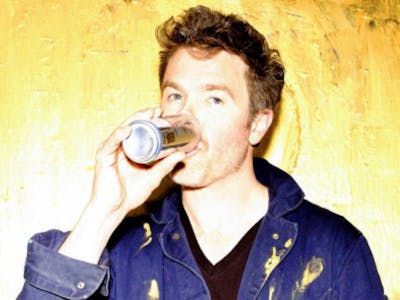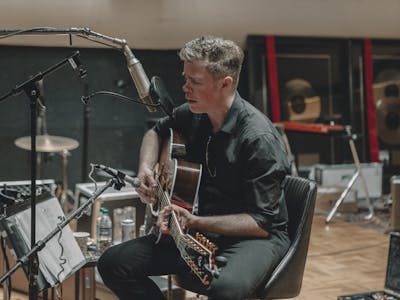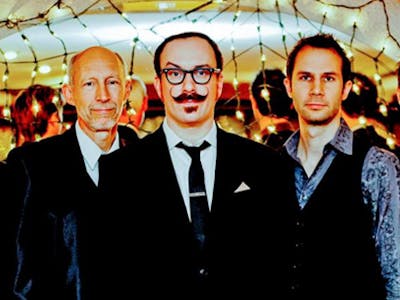Josh Ritter is ever-restless. His records always seem like a snapshot of a period in his life, delivered in two year increments, changing in sound and mood from one to the next. Last fall, the Brooklyn-via-Idaho songwriter released his eighth album, the rollicking, eclectic Sermon on the Rocks, on his own Pytheas imprint. Josh and his Royal City Band bring their electrifying stage show to The Taft Theatre on Monday, February 29th. Ritter was kind enough to take the time to chat with us earlier this month, covering everything from novel writing to parenthood to his work with rock legends and his time living abroad.
Caitlin Tracey-Miller: Sermon on the Rocks has a really broad sonic palette. Did you have an idea of what the record would sound like, or did it come together while you were recording it in New Orleans?
Josh Ritter: I had a general idea that the band could rock, you know? [Laughs] That’s all I really knew. I had demoed some of the songs more extensively, as a way of writing, and so I had an idea that there would be some things I knew what they’d sound like. But really that’s one of the best parts about making a record, maybe one of the reasons to make it, you come in with an idea of what it’s going to sound like and it comes out sounding totally different. If I had a plan now to go in and make Sermon on the Rocks 2, I know it wouldn’t end up the way I thought it would, you know? It’s just that kind of weird thing. But the sonic palette, that comes about [because] we all know each other, and then you put us in a room with a whole bunch of new instruments in a nice studio, and it’s just so fun to watch the guys go nuts.
CTM: I noticed that you’ve really been playing a lot with your voice on this album and doing some different things.
JR: I’ve just been trying to loosen up, you know? Loosen up and have fun singing these songs. There’s nothing to be embarrassed about. If your grandma’s there and everyone’s there and you’ve got your swimming trunks on, jump in the pool. And so suddenly with that realization, all these new voices started coming out, which made it so every day you were wondering what was going to happen.
CTM: I know you’re still pretty early in the touring cycle of this record, but are there particular songs that are already proving to be a lot of fun live?
JR: The funny thing about these songs is they’ve fallen into a set in a really great way, they feel very natural together. I think “Young Moses” and “Birds of the Meadow” straight out of the gate are some of the more electrifying moments of my career so far. I’m pretty psyched about it.
CTM: Do you have as much fun performing as you always seem to? You’re such a joyful presence onstage.
JR: Oh, yeah. I am lucky that way. I have friends who are incredibly talented people who just don’t love and crave that kind of thing like I do. I feel really lucky about that, actually. I totally enjoy it.
CTM: What was the genesis of the track “Seeing Me ‘Round”? It doesn’t feel like anything you’ve done before.
JR: Sometimes you get stuck in a certain way of writing, you know? The rhythm of the guitar is the same, you find yourself returning to the same chords. Sometimes I find switching to a different instrument, especially one I don’t know, really helps me to write in a different way. Me on the piano is like Frankenstein on the piano. It’s not a graceful fit. But I had these three chords, and I just started writing around those three chords, and used it as a chance to learn something about how to record music. It was really fun to demo it and just to follow where the sound took me. And then once I was there, I was like, “This is another really weird zombie love song like I tend to write all the time.” But yeah, that’s how it came about, does that make sense?
CTM: I also noticed the coming of age is a major theme on this album. Did you draw on some of your own experiences of youth, or is there a lot of fiction in these songs?
JR: Well, I think there’s a lot more teenage romance in these songs than I was ever invited to, but for all that, the sensory overload of going home kind of transcends anything, transcends family, transcends everything, it’s an icepick into your brain, the smell of the pine trees and the dust. If I know about anything, I can write about that, and since that’s the time when I first woke up to the world, I feel like it was a very easy time to write about.
CTM: I know you grew up in a fairly rural area, and you’ve since lived in New York City. Do you find that those rural settings really influence your songwriting?
JR: Yes. Absolutely, they’re all over. We didn’t live out at the edge of nowhere, but we were pretty far away from town. We had a TV station. But if you wanted to spend time, if you wanted to entertain yourself, what you did was just go to the woods. That was one thing that got in my brain and is still there, even though I live in Brooklyn now.
CTM: I also notice a lot of historical references in your songs, is there a period in history that you find especially compelling?
JR: Oh, man. History, for me, I don’t study it, I run through it, and there’s a lot of stuff that fascinates me on the story front. There’s not a time that isn’t full of portent, and that’s great. You can pick up any book off a shelf and find a story in there.
CTM: I know you’re also, in addition to being a songwriter, an acclaimed novelist, and I really enjoyed reading your novel Bright’s Passage a couple of years ago. Are there parallels between your processes of songwriting and novel writing, or are they different beasts entirely?
JR: I have such a profound respect for people that can, every day, sit down and write a little bit on something that no one else can see, and who can live inside their minds for years at a time. That, to me, is like one of those people going into one of those hypnotic trance states and their heartbeat drops and their blood pressure goes way down and they just live in a stasis. That’s what it seems like to me. It seems acrobatic. And for me, I can write a song and I can put it on the web at the end of the day, and anybody who ever wanted to could hear it. That’s an amazing thing for us as musicians, but it does give me a real respect for how career novelists work. I really, really enjoyed working on Bright’s Passage, and I want to do it again. The next time, I’m going to go into it with a clear-eyed idea of exactly how much time I’ll be spending in my own brain. I think there has to be a specific time for that. But I loved it. I’d say the way they are related, the way that’s best for me to think about it, is that each word has to follow up a perfect word, and there’s no getting off the hook because you don’t have to rhyme, you know?
CTM: Did you find it a difficult process?
JR: Well the initial first draft, I wrote it in about a month and a half while I was on the road. To get the finished product, to arrive there, took another ten months of editing and rewriting. There were moments of exhilarating downhill flying, and it felt great, but you do have to pick it up and do some dry, dreary work, stuff that isn’t as exciting. But it’s such a cool experience, and there are so many stories in the world, and you come up with them all the time, and when you can’t get them all out, that’s frustrating. But to get the chance to work on a novel is a rarified experience.
CTM: Changing track a little bit, I know you’ve been working on a collaboration with the Grateful Dead’s Bob Weir. How’s that project coming along, and is there a timeline for it coming out?
JR: It’s great. He came to the show and played with me in San Francisco when we were just there, and played a couple of the songs off the record we’ve been working on. It’s just an incredible experience, like--Bob Weir! This huge figure in American music, and to get to work with him is phenomenal. I’m working on some of these songs in my own room, because it’s almost too much to think of bringing him this stuff. But yeah, it’s awesome. It’s an amazing experience. And I’m really hoping that it’ll be coming out soon.
CTM: Are there other dream collaborations you’d like to do in the future?
JR: There’s stuff that I would love to do. People say they would want to produce something, but I would just be happily in the room with somebody, making a record they were really excited about. There’s people that continue to progress and change, even now, like Leonard Cohen, his sound is changing. I would love to work with someone who’s been around awhile and wants to try something different. That’s what I want to do too, I want to enjoy it. I want to be surprised. [Pauses] Benjamin Franklin, though would be awesome.
CTM: That would be electric!
JR: [Laughs] He would be! Glass harmonica, you know? Electric. He did it all. He set up the whole rock band.
CTM: On a personal note, I had the opportunity to see you in Edinburgh, Scotland when I was studying abroad in 2008. I was wondering if you could talk about your time in the UK, and if you still feel a connection to those places in your work?
JR: I first lived in the UK when I was ten years old, for a year, and I remember returning to Edinburgh when I was in college and studying at the School of Scottish Studies and listening to a lot of old, old music, and getting a lot more in love with American music. The funniest thing, I think, about being there, is that at that time it cemented my own expression in music, and finding music by people. I seemed to have moved towards all the things I now find dear to my heart, everything from Roger Miller to The Magnetic Fields to Mississippi John Hurt. And that was the thing about living there, was having all this time with music. I would wander for hours and hours and just listen to my Walkman. Which now seems to be like like carrying around a record player. And then playing in Ireland added to that, that kind of love of language and music, and music from the States. Roots music is so appreciated [over there].
CTM: I know that you are a parent now, is your little one on tour with you this time?
JR: Yes, she is! Yeah, it’s an amazing time we get to have. She’s just getting to the age now where she can appreciate it and she can have fun. We see a lot of Children’s Museums and get to travel as a family. It’s pretty cool! I’m very lucky to get to travel with my family, it’s not a possibility for so many musicians, but I feel proud to be able to do it.
CTM: Well we’re really looking forward to having you in Cincinnati, thank you so much for taking the time to talk to me today!
JR: I cannot wait! The Taft is an amazing place. I can’t wait to play there again.
Enter to Win Tickets to the show HERE.
Josh Ritter & The Royal City Band with special guest Barnstar
Monday, February 29|
7:30 PM [6:30 doors]
Taft Theatre, 317 E. 5th Street Downtown
$28.50-38.50




